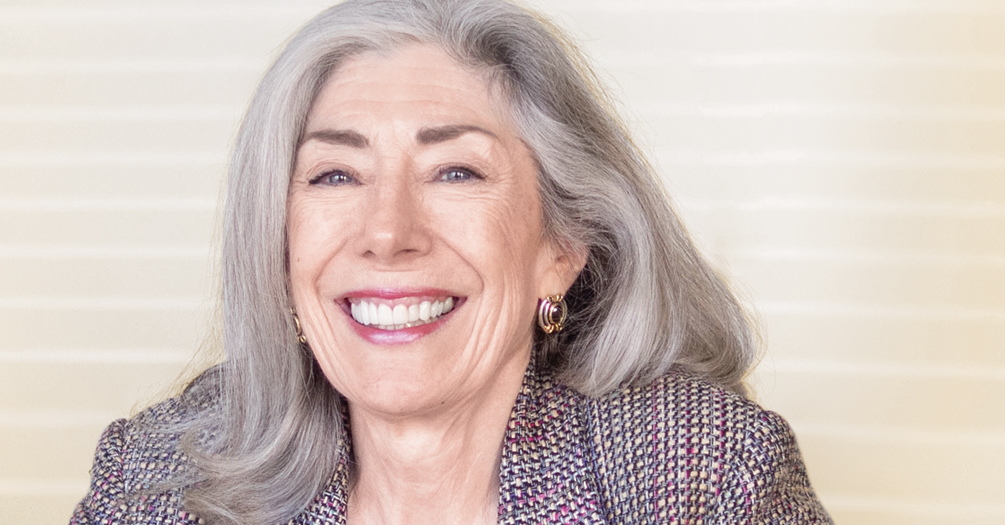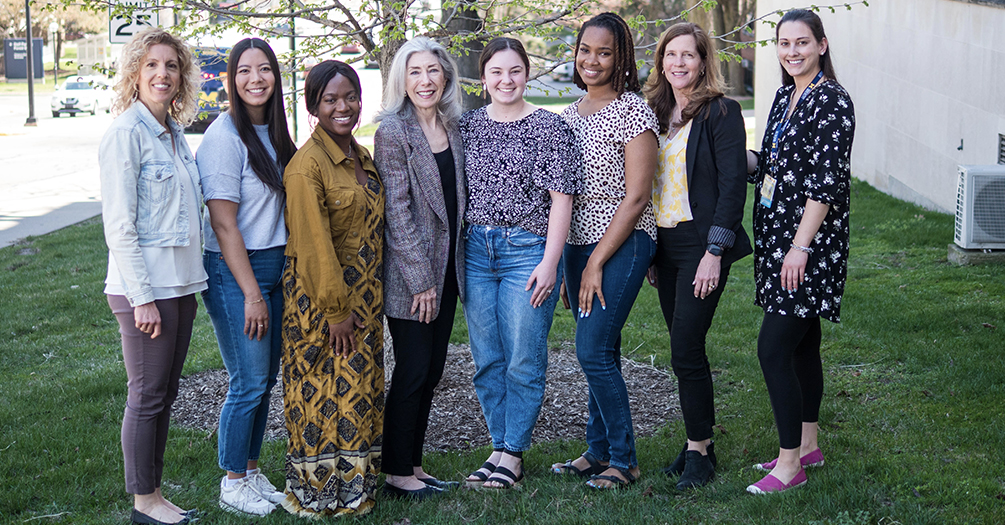Louise Merriman’s lifelong dedication to nutrition culminates in planned gift to Nutritional Sciences

By Bob Cunningham
Culinary medicine is something Louise Merriman holds “near and dear to her heart”—a concept she has incorporated in her career as a Registered Dietitian for nearly 40 years.
Merriman was inspired by her father, who trained at the Detroit College of Medicine and Surgery—now Wayne State University School of Medicine—graduating with his brother, Amherst, in 1921. Dr. Kenneth Scott Merriman understood the principles of “food as medicine” throughout his career as a medical doctor, a surgeon and a public health administrator.
Merriman is supporting the University of Michigan School of Public Health’s Department of Nutritional Sciences through a new, seven-figure planned gift, the Drs. Kenneth Scott and Amherst Merriman Culinary Medicine Fund.
The science of culinary medicine and the value of interprofessional education and teamwork will be greatly enhanced in the Department of Nutritional Sciences due to the generosity of Louise Merriman,” said Susan Aaronson, director of the Dietetics Program at Michigan Public Health. “Her bequest will allow future students to study the important role that cooking, selecting and preparing nutritious and minimally processed food plays in disease prevention and management.”

Inspiration also came from Frances Moore Lappé’s now iconic 1971 cookbook “Diet for a Small Planet,” which Merriman first read as a young student at the University of Michigan.
“It really impressed me early on in my studies and in my career that what we do to best sustain our bodies also supports what we would do to best sustain our planet,” she said. “I like the wisdom and simplicity of that; this concept has guided me ever since, in terms of my professional practice and personal lifestyle. Eating lower on the food chain is the right thing to do not only from a health perspective, but also from a social and ecological perspective.”
“Diet for a Small Planet” argues that ensuring access to a nutritious and eco-friendly diet can serve as a worldwide catalyst for improved ecological conditions, well-functioning democratic systems, robust economies and enhanced societal fairness. Although this notion may appear conventional nowadays, it was truly groundbreaking during its inception.
Culinary medicine is an emerging field that combines the principles of nutrition and culinary arts with medical knowledge to promote and support overall health and well-being. It focuses on using food as a therapeutic tool to prevent and manage various health conditions.
The practice involves educating healthcare professionals, including doctors and dietitians, as well as chefs and the general public, about the importance of making informed food choices along with the techniques of preparing nutritious and flavorful meals.
Culinary medicine emphasizes the use of whole, minimally processed foods and encourages the adoption of healthier eating habits to prevent and manage chronic diseases such as diabetes, heart disease, cancer and obesity. In doing so, it helps to bridge the current gap between medical care and nutrition knowledge.
Merriman believes this is an area where graduates from Michigan Public Health’s Nutritional Sciences program can make a difference.
“We’ve heard for decades that doctors don’t receive the training in nutrition that they want and need,” she said. “Hippocrates, who laid the foundation for medical training, spoke about the importance of nutrition many centuries ago. Yet now in the 21st century, most physicians don’t understand how nutrition can impact patient outcomes and disease prevention.
Interprofessional nutrition education is foundational to disease prevention and treatment. Education needs to include the whole-food, plant-based lifestyle that promotes consumption of fruits, vegetables, beans and legumes, whole grains, nuts and seeds, herbs and spices, and mushrooms while minimizing or excluding animal products and highly processed foods.”
“Interprofessional nutrition education is foundational to disease prevention and treatment. Education needs to include the whole-food, plant-based lifestyle that promotes consumption of fruits, vegetables, beans and legumes, whole grains, nuts and seeds, herbs and spices, and mushrooms while minimizing or excluding animal products and highly processed foods.”
Merriman, who grew up in Michigan, received a Bachelor of Science degree in Physical and Biological Anthropology from the University of Michigan in 1976. After completing her internship at the Mayo Clinic-St. Mary’s Hospital in Rochester, Minnesota, she completed her graduate studies at the University of Minnesota, earning a Master of Science in Clinical Nutrition.
She went on to work at several academic medical centers before spending most of her career at New York-Presbyterian Hospital as the administrative director of Clinical Nutrition. Throughout her career, Merriman developed and provided oversight for programs incorporating food as medicine in the care of chronically and acutely ill patients.
Merriman initially got into nutrition through an early interest in genetics.

“I was taking biological anthropology courses at Michigan, learning about genotype and phenotype,” she said. “My coursework taught me that the environment greatly influences how we manifest our genetic potential, and that the most significant part of the environmental influence is nutrition.”
Merriman also took nutrition classes in the School of Public Health, and that’s why she holds Michigan Public Health near and dear to her heart with very fond memories of professors such as Dr. Alan Tsai, who impressed her “so much, not only for his knowledge of nutrition and biochemistry, but also for his humor and approachability.”
Merriman’s father, Kenneth Scott Merriman; brother, Kenneth Scott Merriman II; grandfather, Henry Harrison Merriman; and uncle, Amherst Merriman; were trained as medical doctors, so it was natural for her to have a career in healthcare.
“I was fortunate to have a direct role in the growth and development of our clinical nutrition program along with our dietetic internship program,” said Merriman, who worked at New York-Presbyterian Hospital from 1986 to 2020. “While I wasn’t providing direct care to patients, I had the privilege of working with extremely talented and passionate dietitians and interns. I’m delighted to still be involved as a member of the New York-Presbyterian Hospital Dietetic Internship Advisory Board.”
She visited the Ann Arbor campus in the spring and said she was emboldened by the leadership of the university and the School of Public Health under President Santa J. Ono and Dean F. DuBois Bowman, respectively.
“Now coming back full circle, it’s wonderful to see what’s happening at Michigan overall and in the School of Public Health,” Merriman said. “It’s really amazing and great to be back.”
Merriman reminisced how receiving a scholarship in high school through the American Cancer Society allowed her to participate in basic research.
“I wouldn’t have had that first experience had it not been for someone who endowed money for that scholarship,” Merriman said. “I’ve always been very proud of and very thankful for the education that I got at the University of Michigan; I think so fondly of the years that I spent here. In New York City, I see so many people wearing the Block M, and I, myself, wear it proudly as I’m walking down the street. It has always been my intention, as I was determining what our estate plan would be, to give back to the University of Michigan.
“I’ve had such an extraordinary opportunity in my life and career, the foundation of which has been the education that I received at the University of Michigan. To have a legacy in mentoring so many in healthcare professions—not just dietetic interns, but medical students and students in other professional groups—has been so rewarding. This gift not only pays it forward, but it will also help in promoting what we know is one of the key pillars of good health, and that’s appropriate nutrition.”
- Interested in public health? Learn more here.
- Read 'Amir and Nicole Rubin's transformational gift elevates Michigan Public Health leadership.'
- Through estate giving, Louise Merriman has made an incredible impact on the future of the Department of Nutritional Sciences. Learn more about how your estate gift can have an impact at Michigan Public Health.
